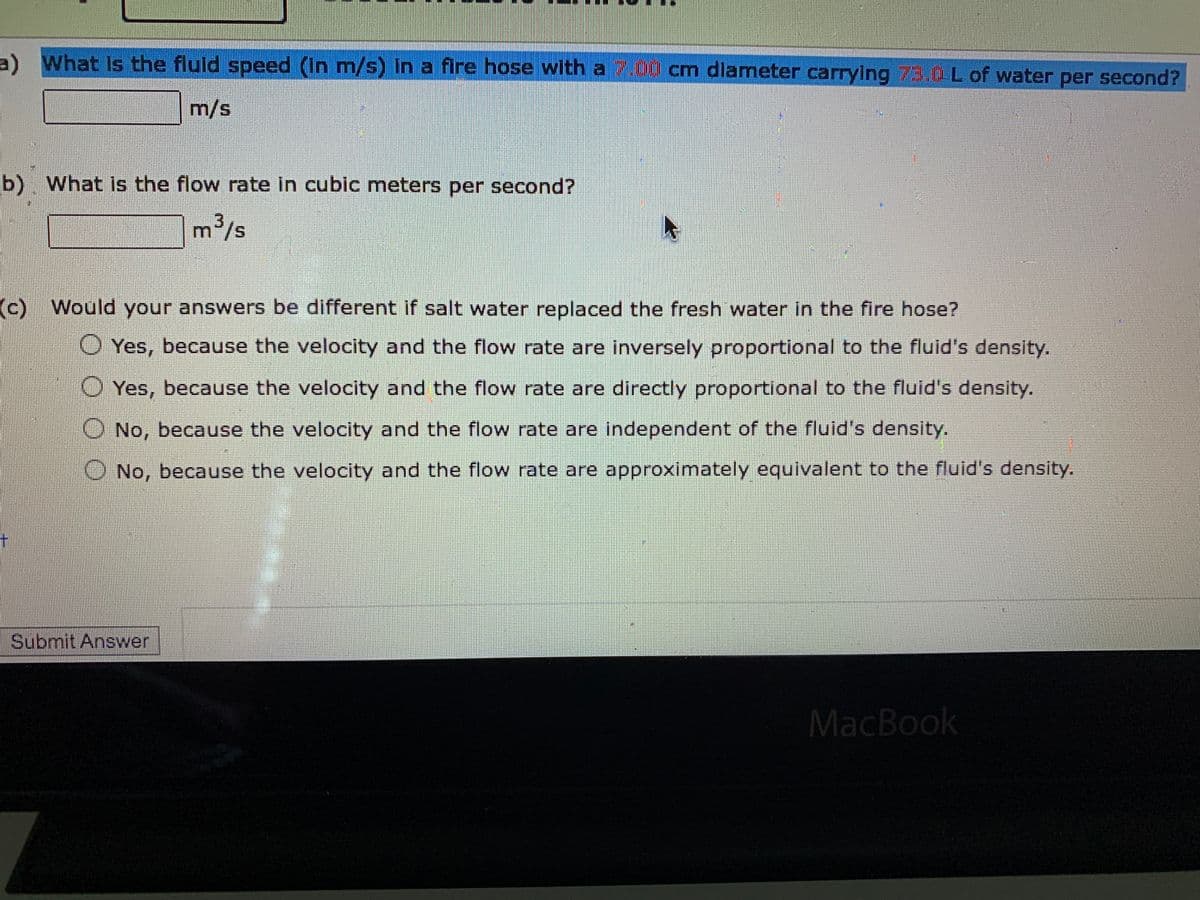3) What is the fluid speed (in m/s) in a fire hose with a 7.00 cm diameter carrying 73.0L of water per second? m/s b) What is the flow rate in cubic meters per second? m³/s (c) Would your answers be different if salt water replaced the fresh water in the fire hose? Yes, because the velocity and the flow rate are inversely proportional to the fluid's density. Yes, because the velocity and the flow rate are directly proportional to the fluid's density. O No, because the velocity and the flow rate are independent of the fluid's density. No, because the velocity and the flow rate are approximately equivalent to the fluid's density. + MacBook Submit Answer
3) What is the fluid speed (in m/s) in a fire hose with a 7.00 cm diameter carrying 73.0L of water per second? m/s b) What is the flow rate in cubic meters per second? m³/s (c) Would your answers be different if salt water replaced the fresh water in the fire hose? Yes, because the velocity and the flow rate are inversely proportional to the fluid's density. Yes, because the velocity and the flow rate are directly proportional to the fluid's density. O No, because the velocity and the flow rate are independent of the fluid's density. No, because the velocity and the flow rate are approximately equivalent to the fluid's density. + MacBook Submit Answer
College Physics
1st Edition
ISBN:9781938168000
Author:Paul Peter Urone, Roger Hinrichs
Publisher:Paul Peter Urone, Roger Hinrichs
Chapter12: Fluid Dynamics And Its Biological And Medical Applications
Section: Chapter Questions
Problem 11PE: (a) What is the fluid speed in a fire hose with a 9.00-cm diameter carrying 80.0 L of water per...
Related questions
Question

Transcribed Image Text:a) What is the fluid speed (in m/s) in a fire hose with a 7.00 cm diameter carrying 73.0L of water per second?
m/s
b) What is the flow rate in cubic meters per second?
m³/s
(c) Would your answers be different if salt water replaced the fresh water in the fire hose?
Yes, because the velocity and the flow rate are inversely proportional to the fluid's density.
Yes, because the velocity and the flow rate are directly proportional to the fluid's density.
No, because the velocity and the flow rate are independent of the fluid's density.
No, because the velocity and the flow rate are approximately equivalent to the fluid's density.
MacBook
Submit Answer
Expert Solution
This question has been solved!
Explore an expertly crafted, step-by-step solution for a thorough understanding of key concepts.
Step by step
Solved in 2 steps with 2 images

Knowledge Booster
Learn more about
Need a deep-dive on the concept behind this application? Look no further. Learn more about this topic, physics and related others by exploring similar questions and additional content below.Recommended textbooks for you

College Physics
Physics
ISBN:
9781938168000
Author:
Paul Peter Urone, Roger Hinrichs
Publisher:
OpenStax College

Physics for Scientists and Engineers: Foundations…
Physics
ISBN:
9781133939146
Author:
Katz, Debora M.
Publisher:
Cengage Learning

College Physics
Physics
ISBN:
9781305952300
Author:
Raymond A. Serway, Chris Vuille
Publisher:
Cengage Learning

College Physics
Physics
ISBN:
9781938168000
Author:
Paul Peter Urone, Roger Hinrichs
Publisher:
OpenStax College

Physics for Scientists and Engineers: Foundations…
Physics
ISBN:
9781133939146
Author:
Katz, Debora M.
Publisher:
Cengage Learning

College Physics
Physics
ISBN:
9781305952300
Author:
Raymond A. Serway, Chris Vuille
Publisher:
Cengage Learning

University Physics Volume 1
Physics
ISBN:
9781938168277
Author:
William Moebs, Samuel J. Ling, Jeff Sanny
Publisher:
OpenStax - Rice University

College Physics
Physics
ISBN:
9781285737027
Author:
Raymond A. Serway, Chris Vuille
Publisher:
Cengage Learning

Principles of Physics: A Calculus-Based Text
Physics
ISBN:
9781133104261
Author:
Raymond A. Serway, John W. Jewett
Publisher:
Cengage Learning